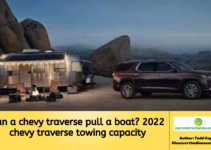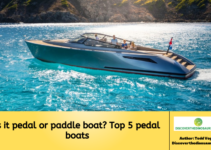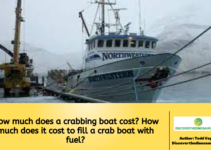Can you pull a boat behind a bumper pull camper? Many people are not sure if they can pull a boat behind their camper because they are not sure what the towing capacity is.
You can pull a boat behind most bumper pull campers as long as you stay within the weight limits of your vehicle and the camper. For more information, please consult your vehicle owner’s manual or speak with a qualified towing specialist.
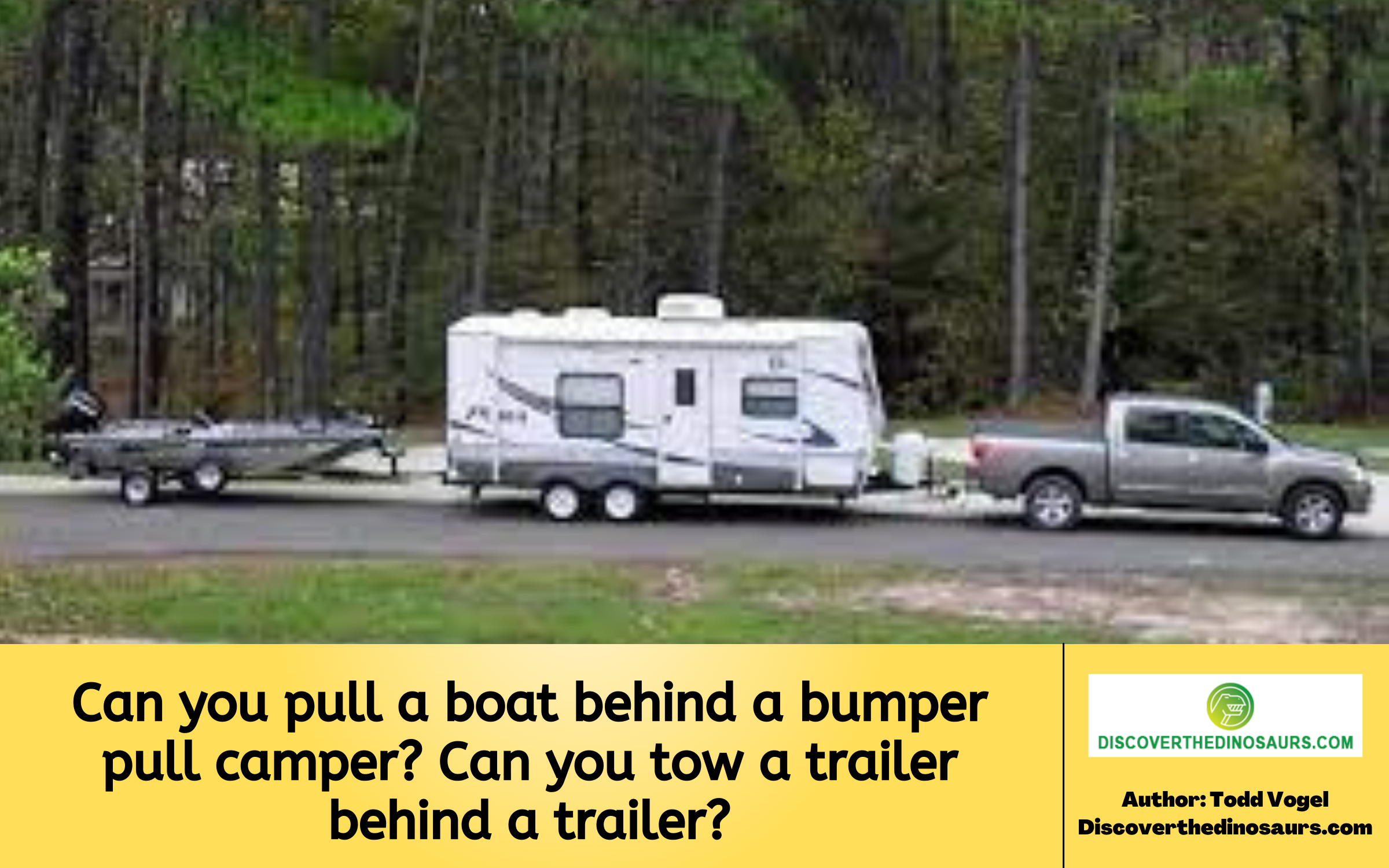
Can you pull a boat behind a bumper pull camper?
With only 3 minutes of reading the article, Todd Vogel will help you answer the question “Can you pull a boat behind a bumper pull camper? ” and provide more relevant knowledge. Let’s find out together!
Can you pull a boat behind a Bumper Pull Camper?
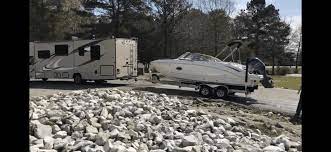
Can you pull a boat behind a Bumper Pull Camper?
The answer is yes, but there are a few things you need to take into consideration before hitching up your boat. The first thing is the size and weight of your boat.
You will need to make sure that your camper can handle the weight of the boat, as well as any gear or supplies you have on board.
If you have a travel trailer, are you able to pull a boat behind it? (Laws of the States)
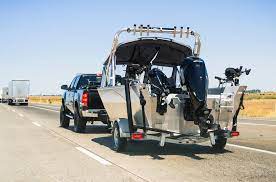
If you have a travel trailer, are you able to pull a boat behind it? (Laws of the States)
There are a few states that don’t allow it, but in the majority of cases, you’ll be able to pull two different things behind your truck. Having stated this, there may be a variety of circumstances to which you will be required to adhere in order to be in compliance with the law.
Some of restrictions could include limiting bumper pull trailers to the second position in the chain and requiring the use of fifth-wheel or gooseneck trailers for the first trailer in the chain.
Additionally, in order to comply with the rules of the state, the initial trailer might require the requisite brakes as well as safety chains.
Depending on the combined gross weight of the boat and trailer, the boat trailer could additionally need to be equipped with safety chains and brakes. Brakes are often required for anything that weighs more over 3,000 pounds.
As you can see, before making plans to pull double trailers with your pickup truck, you need thoroughly research the legal requirements of both states.
Because we want to make things as easy as possible for you, we have compiled a state-by-state guide that will tell you whether or not this behavior is permitted in the location that you intend to visit.
| State | Is It Legal? |
| Alabama | No |
| Alaska | Yes |
| Arizona | Yes |
| Arkansas | Yes |
| California | Yes |
| Colorado | Yes |
| Connecticut | No |
| Delaware | No |
| Florida | No |
| Georgia | No |
| Hawaii | No |
| Idaho | Yes |
| Illinois | Yes |
| Indiana | Yes |
| Iowa | Yes |
| Kansas | Yes |
| Kentucky | Yes |
| Louisiana | Yes |
| Maine | No |
| Maryland | Yes |
| Massachusetts | No |
| Michigan | Yes |
| Minnesota | Yes |
| Mississippi | Yes |
| Missouri | Yes |
| Montana | Yes |
| Nebraska | Yes |
| Nevada | Yes |
| New Hampshire | No |
| New Jersey | No |
| New Mexico | Yes |
| New York | No |
| North Carolina | No |
| North Dakota | Yes |
| Ohio | Yes |
| Oklahoma | Yes |
| Oregon | No |
| Pennsylvania | No |
| Rhode Island | No |
| South Carolina | No |
| South Dakota | Yes |
| Tennessee | Yes |
| Texas | Yes |
| Utah | Yes |
| Vermont | No |
| Virginia | No |
| Washington | No |
| West Virginia | No |
| Wisconsin | Yes |
| Wyoming | Yes |
Towing Your Boat Behind a Recreational Vehicle
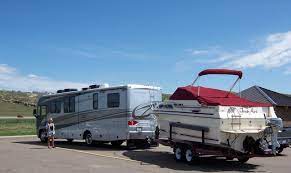
Towing Your Boat Behind a Recreational Vehicle
If you’re planning on towing your boat behind a recreational vehicle, there are a few things you need to keep in mind.
First and foremost, it’s important to make sure that your RV is properly equipped for the task. This includes having a hitch that is rated for the weight of your boat and trailer.
It’s also important to make sure that your RV is able to stop safely. This means having working brakes and enough space between the RV and boat to allow for proper braking.
And finally, it’s important to be aware of the length of your convoy. This will impact how you maneuver and where you can park.
Considerations Regarding Weight
If you’ve ever hauled either a boat or a travel trailer, you’re probably familiar with the process of determining the Gross Vehicle Weight (GVW) for towing safety. The GVW of your boat must be less than the maximum towing capacity of your vehicle as specified by the manufacturer.
The GVW includes not only the weight of the vessel but also any gear or supplies you have on board. The length and width of your boat will also play a role in how much it weighs. Heavier boats will require a more powerful engine to tow them, which is why it’s important to know the GVW before making any hasty decisions.
Your boat trailer will also need to be factored into the equation. The average boat trailer weighs between 1,000 and 2,500 pounds (453 and 1,136 kg). The weight of the trailer will depend on the size and type of boat you have. For example, a fishing boat is going to be much lighter than a pontoon boat.
Additionally, the weight of your vehicle will play a role in how much GVW it can handle. A light-duty truck isn’t going to be able to tow as much as a heavy-duty truck.
The last thing you need to take into consideration is the weight of any gear or supplies you have on board the boat. This includes things like life jackets, fishing gear, and coolers. All of this needs to be taken into account when determining the GVW.
Now that we’ve gone over the basics of GVW, let’s take a look at some of the states that have restrictions on towing two trailers.
The Initial Steps of Preparation
Every trip should begin with standard maintenance checks on all the components of the convoy. This preparation is critical regardless of the destination or whether you’re towing one trailer or two.
The first step is to check the tires on both your vehicle and boat trailer. Make sure that they are properly inflated and have plenty of tread. It’s also a good idea to check the brakes and make sure they are in good working order.
It’s also important to check the hitch on your vehicle and the coupler on your trailer. Make sure that they are properly secured and rated for the weight of your boat.
If you’re going to be towing two trailers, it’s important to make sure that they are compatible with each other. This means that they have the same size coupler and use the same size ball mount.
You should also make sure that both trailers have the proper Lighting. This includes brake lights, turn signals, and tail lights.
Before setting out on your journey, it’s important to test all of the equipment to make sure that it is in good working order. This includes the brakes, lights, and hitch.
It’s also a good idea to do a dry run without the boat to make sure that you can handle the extra weight and length of the second trailer.
Once you’re confident that everything is in good working order, you’re ready to hit the road.
Towing two trailers can be a daunting task, but it’s doable as long as you take the time to prepare and familiarize yourself with the process.
Check out our state-by-state guide above to see if towing two trailers is legal in the state that you’ll be traveling to.
Some Safety Advice for Drivers
Towing two trailers comes with some inherent risks. Here are a few safety tips that you should keep in mind when embarking on your journey.
First and foremost, it’s important to take things slow. This is not the time to try and make good time. The extra weight and length of the convoy will require you to increase your following distance and brake sooner than you’re used to.
It’s also important to be aware of the wind. Strong gusts of wind can cause both trailers to sway. If this happens, it’s important to remain calm and not make any sudden movements. The best course of action is to slowly reduce your speed until the swaying subsides.
And finally, it’s important to make sure that both trailers are properly secured before setting out on your trip. This includes making sure that the hitch is locked and the coupler is properly secured.
By following these safety tips, you can help ensure a safe and successful journey.
Statutes and Rules Governing the Double and Triple Towing of Recreational Vehicles
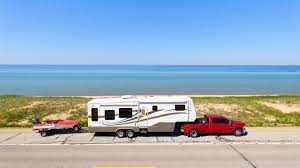
Statutes and Rules Governing the Double and Triple Towing of Recreational Vehicles
In order to tow two or more recreational vehicles, there are a few things you need to keep in mind.
First and foremost, it’s important to make sure that your vehicle is properly equipped for the task. This includes having a hitch that is rated for the weight of your boats and trailers.
It’s also important to make sure that your vehicle is able to stop safely. This means having working brakes and enough space between the vehicle and boat to allow for proper braking.
And finally, it’s important to be aware of the length of your convoy. This will impact how you maneuver and where you can park.
In order to tow two or more recreational vehicles, you need to have a valid driver’s license and insurance. You also need to make sure that your vehicle is properly registered and inspected.
Before setting out on your journey, it’s important to test all of the equipment to make sure that it is in good working order. This includes the brakes, lights, and hitch.
It’s also a good idea to do a dry run without the boat to make sure that you can handle the extra weight and length of the second trailer.
Once you’re confident that everything is in good working order, you’re ready to hit the open road. Just remember to take things slow and be aware of the extra length of your convoy.
With a little bit of preparation, you can safely tow two or more recreational vehicles behind your vehicle.
Maintaining Control of Your Recreational Vehicle While Towing Your Boat
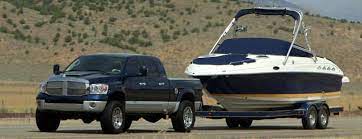
Maintaining Control of Your Recreational Vehicle While Towing Your Boat
The climate
The first thing you need to consider is the weather. Towing a boat in bad weather is dangerous and should be avoided if possible. If you must tow in bad weather, take extra care to go slow and be aware of changing conditions.
Go for a Spin in the Vehicle
Before you go on your trip, drive around with your boat attached. This will give you a feel for how the extra weight affects your vehicle. Pay attention to how the vehicle handles and make sure that you’re comfortable with it before setting out on your journey.
Take Extra Caution When Turning
When you’re turning, take extra care to slow down and make wide turns. This will help prevent the boat from swinging out and hitting something.
Establish Connections for the Lights and Signals
Before you set out, make sure that the boat’s lights and signals are properly connected to the vehicle. This way, you can be sure that they’re working and that other drivers will be able to see you.
Make Use of Chains for Safety
If you’re going to be traveling in poor weather, it’s a good idea to use chains. This will help keep the boat from swinging out and hitting something.
Check for blind spots before lane changes
When you’re changing lanes, make sure to check for blind spots. The boat can block your view of traffic and make it difficult to see other vehicles.
Be sure to equip each load with reflectors
It’s important to be visible when you’re on the road. Be sure to equip each load with reflectors so that other drivers can see you.
Do I Need a Special Permit to Tow My Boat Behind My RV or Travel Trailer, or Can I Do It Without One?
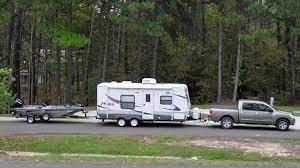
Do I Need a Special Permit to Tow My Boat Behind My RV or Travel Trailer, or Can I Do It Without One?
In order to tow your boat behind your RV or travel trailer, you will need a special permit. However, if you’re only planning on doing it for a short distance, you may be able to do it without one.
If you’re going to be towed over a long distance, it’s best to get a permit. This will ensure that you’re following the law and that you have the proper insurance in case of an accident.
Is it Possible to Stay Aboard Your Boat While It Is Being Towed?
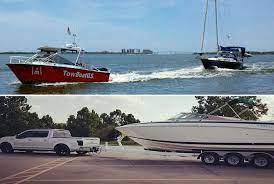
Is it Possible to Stay Aboard Your Boat While It Is Being Towed?
Yes, it is possible to stay aboard your boat while it is being towed. However, you need to be aware of the risks involved.
When you’re being towed, you’re not able to see what’s going on around you. This means that you could be hit by another vehicle or run aground without knowing it.
It’s also important to remember that you lose steering and braking control when you’re being towed. This can make it difficult to avoid hazards.
For these reasons, it’s best to get off of your boat while it is being towed. If you must stay aboard, be sure to stay in a safe location and be aware of the risks involved.
How to Double Tow Vehicles Safely
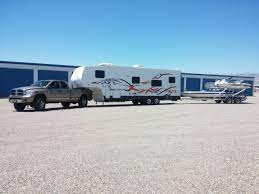
How to Double Tow Vehicles Safely
Mount a Camera on the Rear of Your RV, Boat, or Other Vehicle.
One of the best ways to stay safe when double towing is to mount a camera on the rear of your RV, boat, or other vehicle. This way, you can see what’s going on behind you and make sure that the second vehicle is staying in its lane.
Make Sure You Check Your Route Twice
Before you set out, be sure to check your route twice. This way, you can be sure that you know where you’re going and that there are no hazards along the way.
Make Sure That You Check Your Measurements
When you’re double towing, it’s important to make sure that you check your measurements. This way, you can be sure that your vehicles are the correct distance apart.
If you’re not careful, you could end up causing an accident. So, be sure to take your time and make sure that everything is done correctly.
Please Drive With Caution
When you’re double towing, it’s important to drive with caution. This means obeying the speed limit and being aware of your surroundings.
It’s also a good idea to avoid making sudden lane changes or turns. This could cause the second vehicle to swing out and hit something.
Double towing can be safe if you’re careful. However, it’s important to remember that there are risks involved. Be sure to drive with caution and be aware of the hazards.
F.A.Q about “Can you pull a boat behind a Bumper Pull Camper?”
Is it against the law to double-hook up?
No, it’s not against the law to double-hook up. However, you need to be aware of the risks involved.
When you’re being towed, you’re not able to see what’s going on around you. This means that you could be hit by another vehicle or run aground without knowing it.
It’s also important to remember that you lose steering and braking control when you’re being towed. This can make it difficult to avoid hazards.
For these reasons, it’s best to get off of your boat while it is being towed. If you must stay aboard, be sure to stay in a safe location and be aware of the risks involved.
Is it Possible to Tow a Boat Behind a Travel Trailer in the State of Iowa?
Yes, it is possible to tow a boat behind a travel trailer in the state of Iowa. However, you need to have a permit.
The permit will cost you $15 and it’s valid for 90 days. You can get the permit at any Iowa Department of Natural Resources office.
If you’re planning on towing your boat a long distance, it’s a good idea to get a permit. This will ensure that you’re following the law and that you have the proper insurance in case of an accident.
In the province of Saskatchewan, is it possible to tow a boat behind a travel trailer?
Yes, it is possible to tow a boat behind a travel trailer in the province of Saskatchewan. However, you need to have a permit.
The permit will cost you $15 and it’s valid for 90 days. You can get the permit at any Saskatchewan Ministry of Parks, Culture and Sport office.
If you’re planning on towing your boat a long distance, it’s a good idea to get a permit. This will ensure that you’re following the law and that you have the proper insurance in case of an accident.
Is a Pop-up Camper Compatible with a Subaru Forester as a Towing Vehicle?
Yes, a pop-up camper is compatible with a Subaru Forester as a towing vehicle. However, you need to have the proper hitch and wiring installed.
You can get a hitch and wiring installation kit from your local Subaru dealer. The cost will vary depending on the kit that you choose.
It’s important to remember that you need to have the proper equipment when you’re towi ng. This will ensure that you’re following the law and that you have the proper insurance in case of an accident.
In the province of Ontario, is it legal to pull two trailers?
You are not permitted by the law to pull two trailers in Ontario, thus pulling two trailers at the same time is not possible. It is generally against the law for a non-commercial vehicle in Ontario to pull more than one trailer at a time, and this restriction applies to towing as well.
In the state of Florida, is it possible to tow a boat behind a travel trailer?
Additional Prerequisites. Double tandem towing is prohibited in the state of Florida (a vehicle pulling a trailer and a boat, or two trailers). Safety chains, reflectors, license plate lights, tail lights, turn signal lights, and brake lights are all required on trailers.
Is it legal to double-stack a trailer in Florida?
In the state of Florida, doubling up on trailers is against the law. Only turnpikes and interstates that have been given the green light by the Department of Transportation are appropriate for double-towing by commercial vehicles.
Is pulling two trailers legal in the state of Wisconsin?
Towing two brand-new trailers or semi-trailers that will be used for transporting farm products or livestock does not require a special permit for pickup trucks as long as one of the following conditions is met: the trailers are being transported from manufacturer to dealer or from dealer to dealer.
The maximum length of a motor truck is twenty-five feet. The maximum length of any trailer does not exceed 28 feet and 8 inches.
Is it legal to pull a boat and a trailer at the same time in the province of Ontario?
This is not the case in all of the states and provinces that have laws that permit the towing of more than one vehicle. For example, trailers with two ball hitches are permitted in the province of Ontario.
Despite how crazy it may appear, it is entirely legal in this place. Simply put, it is not allowed to sway to an excessive degree, which is something that should be expected of any trailer.
Conclusion
Can you pull a boat behind a bumper pull camper? The answer is yes, but there are a few things to consider before making the decision. Weight capacity and tow ratings should be your first consideration, followed by the size of your boat and finally, your personal comfort level.
If you can find a trailer that meets all of your needs, go for it! Towing a boat behind your camper can provide hours of fun and relaxation on the open water.
This discoverthedinosaurs.com will show the information about “Can you pull a boat behind a bumper pull camper?”
- can you pull a trailer behind a bumper pull camper
- can you pull a boat behind a fifth wheel
- what states can you pull a trailer behind a fifth wheel
- can you pull a boat behind a travel trailer in michigan
- can you pull a boat behind a travel trailer in texas
- can you tow a trailer behind a trailer
- can you tow a boat behind a pop up camper
- pulling a camper and a boat at the same time

